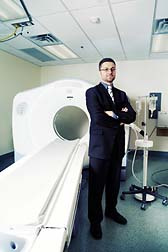 The Journal of Urology (2008 Sep;180(3):830-5) reported an investigation by the Division of Nephrology, Vanderbilt University Medical Center. "Magnetic resonance imaging using gadolinium based contrast agents must be performed judiciously in patients with renal dysfunction, carefully weighing on a case by case basis the benefits of magnetic resonance imaging and the risk of nephrogenic systemic fibrosis as well as the disadvantages of undergoing alternative or foregoing imaging studies," said writers G. Bhave, J. B. Lewis and S.S. Chang.
The Journal of Urology (2008 Sep;180(3):830-5) reported an investigation by the Division of Nephrology, Vanderbilt University Medical Center. "Magnetic resonance imaging using gadolinium based contrast agents must be performed judiciously in patients with renal dysfunction, carefully weighing on a case by case basis the benefits of magnetic resonance imaging and the risk of nephrogenic systemic fibrosis as well as the disadvantages of undergoing alternative or foregoing imaging studies," said writers G. Bhave, J. B. Lewis and S.S. Chang.Their data from case series reports, nephrogenic systemic fibrosis patient databases, nephrogenic systemic fibrosis case reporting to the FDA after gadolinium contrast agent exposure and retrospective case control studies also showed that occurrence of NSF after gadolinium contrast agent exposure "may vary from negligible up to 2 percent to 5 percent in select high risk clinical situations".
This report is cause for concern for patients who have even moderate renal insufficiency (60< GFR >30). NSF symptoms are known to develop within weeks to months after exposure to GBMCA, however there can also be a latency period from 1 to 2 years. Patients with any degree of renal insufficiency who have received gadolinium in the past few years are advised to receive close follow-up. The experts concluded that "Further research needs to be directed to finding agents that will stabilize gadolinium and make MRI imaging safe even in patients with CKD" {chronic kidney disease].
Is Magnetic Resonance Imaging (MRI) Safe?
READ MORE MRI HEALTH RISK LEGAL NEWS
MRA and Gadolinium Off-label Use
Gadolinium-based contrast agents are also used with magnetic resonance angiography (MRA), an imaging procedure used to evaluate blood vessels. However, it is only used off-label: the FDA has not approved GBCAs for use with MRA procedures. As well, up to 3 times as much contrast dye is used with MRAs compared with MRIs, which could potentially cause serious risk of NSF for patients getting an MRA.
